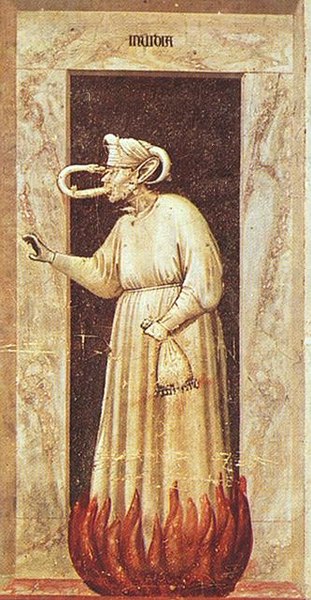http://www.newadvent.org/summa/3036.htm
America is purposefully being led into class warfare by the Marxist vocabulary of both parties, but most especially, by the words of the Democrats. This is not a new phenomenon, but one which has increased in influence since I left America almost exactly three years ago.
Now that I am in the Midwest again, I find that it is not the poor who hate the rich, but the middle-classes. Years ago, I told an Irishman that he would not get into heaven with hatred for the English in his heart. The middle class members will not get into heaven with hatred for the rich in their hearts.
Hatred of the rich, as St. Thomas Aquinas points out in the above section of the Summa, reveals the sin of Envy. Envy can become an obsession, and many so-called "socialist" are obsessed with the wealth of the rich.
Some Catholics go so far as to say that all rich people are evil and have gained their wealth through sin. Of course, this is simply not true. Many hard-working and honest people have become wealthy without stealing or lying.
Envy ties up grace and causes a twisting of the intellect. It is a sin which can grip a people and turn hearts into ashes.
All hatred is evil, but the sin of envy must lash out and detract.
Pray for those who have fallen prey to the sin of hatred of the rich. The poor are not honored by such hatred and envy.
I remove myself from the company of those who are envious. They seem to be stuck. Pray for them.
 |
| http://commons.wikimedia.org/wiki/File:Giotto_-_Scrovegni_-_-48-_-_Envy.jpg |
I answer that, Just as sloth is grief for a Divine spiritual good, so envy is grief for our neighbor's good. Now it has been stated above (Question 35, Article 4) that sloth is a capital vice for the reason that it incites man to do certain things, with the purpose either of avoiding sorrow or of satisfying its demands. Wherefore envy is accounted a capital vice for the same reason.
Reply to Objection 1. As Gregory says (Moral. xxxi, 45), "the capital vices are so closely akin to one another that one springs from the other. For the first offspring of pride is vainglory, which by corrupting the mind it occupies begets envy, since while it craves for the power of an empty name, it repines for fear lest another should acquire that power." Consequently the notion of a capital vice does not exclude its originating from another vice, but it demands that it should have some principal reason for being itself the origin of several kinds of sin. However it is perhaps because envy manifestly arises from vainglory, that it is not reckoned a capital sin, either by Isidore (De Summo Bono) or by Cassian (De Instit. Caenob. v, 1).
Reply to Objection 2. It does not follow from the passage quoted that envy is the greatest of sins, but that when the devil tempts us to envy, he is enticing us to that which has its chief place in his heart, for as quoted further on in the same passage, "by the envy of the devil, death came into the world" (Wisdom 2:24).
There is, however, a kind of envy which is accounted among the most grievous sins, viz. envy of another's spiritual good, which envy is a sorrow for the increase of God's grace, and not merely for our neighbor's good. Hence it is accounted a sin against the Holy Ghost, because thereby a man envies, as it were, the Holy Ghost Himself, Who is glorified in His works.
Reply to Objection 3. The number of envy's daughters may be understood for the reason that in the struggle aroused by envy there is something by way of beginning, something by way of middle, and something by way of term. The beginning is that a man strives to lower another's reputation, and this either secretly, and then we have "tale-bearing," or openly, and then we have "detraction." The middle consists in the fact that when a man aims at defaming another, he is either able to do so, and then we have "joy at another's misfortune," or he is unable, and then we have "grief at another's prosperity." The term is hatred itself, because just as good which delights causes love, so does sorrow cause hatred, as stated above (Question 34, Article 6). Grief at another's prosperity is in one way the very same as envy, when, to Wit, a man grieves over another's prosperity, in so far as it gives the latter a good name, but in another way it is a daughter of envy, in so far as the envious man sees his neighbor prosper notwithstanding his efforts to prevent it. On the other hand, "joy at another's misfortune" is not directly the same as envy, but is a result thereof, because grief over our neighbor's good which is envy, gives rise to joy in his evil.
More here....http://supertradmum-etheldredasplace.blogspot.com/2013/12/the-sins-of-christmas-envy.html
